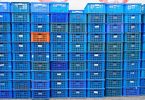E gli Stati Uniti protestano presso il WTO
Gli Stati Uniti hanno accusato il Giappone di praticare restrizioni sleali alle importazioni di mele statunitensi, e hanno informato di conseguenza l’Organizzazione Mondiale del Commercio (WTO).
Nonostante studi condotti congiuntamente da scienziati giapponesi e statunitensi abbiano dimostrato che le produzioni statunitensi siano immuni da fire blight (colpo di fuoco batterico), il Giappone ha di fatto bloccato le importazioni. E’ stato inoltre dimostrato che le mele mature e esenti da sintomi non sono portatrici di colpo di fuoco.
Gli Stati Uniti hanno richiesto al WTO l’istituzione di un comitato che valuti la posizione del Giappone.
La notizia completa:
UNITED STATES FILES WTO CASE AGAINST JAPAN OVER UNFAIR RESTRICTIONS ON AMERICAN APPLES
WASHINGTON, May 10, 2002 – The United States announced today it is initiating a case at the World Trade Organization (WTO) against Japan for unfairly restricting imports of American apples. The Japanese refuse to import almost any American apples even though the apples are certified as safe by U.S. authorities. Joint U.S.-Japanese scientific research has demonstrated that the apples are free of fire blight, a plant bacterial disease that Japan claims is the basis of its plant restrictions on U.S. imports.
For many years, the United States has sought to increase access for U.S. apples in the Japanese market, but to no avail. In pursuing a case at the WTO, the United States will argue that Japan is violating international trade rules by blocking American apples without any scientific or health basis.
?U.S. farmers want to sell our world class apples to Japanese consumers, but they are being blocked. The United States has gone to great lengths to find a scientifically based resolution to this issue. Unfortunately, Japan refuses to modify its onerous import restrictions, despite scientific evidence that they are safe. We are pursuing WTO dispute settlement proceedings to ensure that Japan abides by its WTO obligations to base its plant health regulations on science,? said U.S. Trade Representative Robert B. Zoellick.
?U.S. apples are of high quality and meet strict standards for quality and safety,? said Agriculture Secretary Ann M. Veneman. ?The United States has attempted to work with Japan to resolve these unfair trade practices. We hope this action will result in a resolution to allow our farmers access to the Japanese market.?
Fire blight affects certain types of plants, including pear and apple trees, but does not affect humans. Scientific evidence demonstrates that mature, symptomless apples are not carriers of fire blight. The United States exports $393 million of apples worldwide with few restrictions for fire blight. However, Japan imposes severe restrictions on imports of U.S. apples including unnecessary and costly inspections. These Japanese restrictions limited U.S. apple exports to Japan to only $377,000 in 2001. In comparison, the United States exports $46 million worth of apples to Taiwan.
Background:
In 1997, the United States requested that Japan change its import restrictions on apples based on published scientific evidence showing that mature, symptomless apples are not carriers of fire blight. The United States presented this scientific evidence to Japan in bilateral meetings and correspondence. In 2000, the United States took the unprecedented step of agreeing with Japan to carry out joint research proposed by Japan to confirm the results of those earlier studies. Conducted by the U.S. Department of Agriculture?s Agricultural Research Service (ARS) and Japan?s Ministry of Agriculture Forestry and Fisheries (MAFF), the joint research confirms that mature, symptomless apples are not carriers of fire blight. This finding provides additional scientific support for the U.S. position that Japan?s restrictions are unwarranted. Since releasing the results of this research in February 2001, the U.S. government has repeatedly pressed Japan to change its import restrictions. Despite extensive bilateral discussions with USDA scientists in October 2001, Japan has refused to change its import restrictions.
On March 1, 2002, the United States requested WTO consultations with Japan concerning its import restrictions on U.S. apples. Consultations were held in Geneva on April 18, 2002, but failed to settle the dispute. On May 7, 2002, the United States requested that the WTO establish a panel to consider the Japanese restrictions. The U.S. request is the next step in the WTO dispute settlement process. Once established, the panel will review evidence and hold meetings with the United States and Japan in order to produce a report on the consistency of the Japanese measures with Japan?s WTO obligations.










